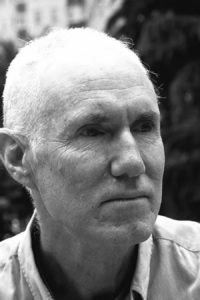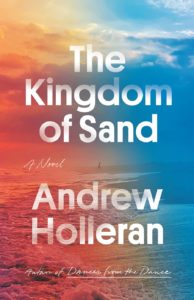In his new novel, Andrew Holleran writes, in a scene set at a North Florida Thanksgiving dinner attended by older gay men, “There is a delicate undercurrent beneath get-togethers among singles on holidays that mingles the comfort of having a friend to relieve your isolation with the realization that the two of you have nobody else.”
That sums up the conflicting mix of alienation, despair, and vibrant engagement evoked by the unnamed narrator at the center of The Kingdom of Sand — an unattached gay man in his 60s who is living in his deceased parents’ home in a rural lakefront town between Gainesville and Jacksonville and gradually losing the aging friends and connections that sustain him in his loneliness.
The novel is the first in 13 years from Holleran, whose 1978 seminal classic Dancer From the Dance turned him into one of the major figures of queer literature in the post-Stonewall generation. That earlier work rhapsodically recalled the sexual explorations and impossible romances of gay men who got caught up in the pre-AIDS bacchanalia that was Manhattan in the ’70s.

Holleran (the pen name of Eric Garber, now 79 years old) immediately stood out as a formidable writing talent: his exquisite prose managed to simultaneously express passion and disillusion with equal precision. Dancer From the Dance gave literary weight to gay men’s desires and ennui as they forged a path in a world with few guideposts. It’s an elegant counterweight to Larry Kramer’s Faggots, a farcical and moralistic epic novel that exposed the emptiness of that world — in downtown nightclubs and the beach houses of Fire Island — with far less grace.
The protagonist of Dancer From the Dance has fled New York City for rural Florida, just as Holleran did, and his subsequent novels have continued the personal recollections of a gay man, like himself, who resides there. Leaving the narrator unnamed in The Kingdom of Sand increases the subjective nature of the prose — you see him almost entirely as he sees himself, and not through others’ eyes — and it also obscures the line between memoir and fiction, since Holleran’s life so clearly matches that of his storyteller. Holleran took a pen name in the ’70s to protect his parents from his sexual honesty, but he has stuck with it, and it still suits the defensive emotions of Kingdom of Sand’s narrator, along with his uncompromising forthrightness.
Holleran is often grouped with Edmund White among queer writers, and though he shares White’s deep respect for his characters, no matter how unsophisticated they are, he exercises none of the florid density one finds in White’s fiction.
An example: “Roads are to Florida what syringes are to veins,” says the narrator in The Kingdom of Sand, “the swiftest means to introduce a foreign element into the body; in this case, humanoids.”
Though he clearly disdains what many Floridians have done to their lush natural environment through mindless development, Holleran’s narrator never talks down to a kitschy or blandly commercial blue-collar or bourgeois aesthetic. Instead, as he faithfully observes Christmas decorations on a nighttime walk by himself — such as a giant Santa balloon lying flat on his back — or the lives of his neighbors, seen through distant lit windows, one senses the narrator’s constant need to connect with other human beings, to touch their hearts, minds, and bodies.

There’s a resigned, existential peace to all his angst about intruding in and retreating from other people’s ongoing dramas, from his sister and her family, who invite him up North annually for Christmas although he’d rather stay home, to other gay men he meets in their parallel quests for anonymous sex at an ancient video arcade or isolated boat ramp.
The narrator resists change, including a move to assisted living or a gay mecca: “Fort Lauderdale, for gay men, was what Israel is for the Jews,” he writes. This sentiment will ring true for some residents of Provincetown and the Outer Cape, and others who fight the lure. He’d rather wander freely in a crazy quilt of retirees and middle-class dislocation than remove himself from the familiar surroundings of his North Florida town and the memories he hopes to preserve.
The main body of the novel is taken up with the decline of, first, the narrator’s parents, then his friend Earl, a lover of classical music, golden-era Hollywood movies, and Civil War books. Earl is 20 years older, and a pioneer on the road to mortality: he stays at home until the end, relying on the full-time assistance of a straight local handyman.
Because Holleran is such a fine writer, who seems only to improve with age, he makes long passages of description, such as travelogues of walks and visits, both exciting and revelatory. His sentences flow with sensual rhythm, without ever being weighed down by overcomplicated syntax or chains of adjectives.
One might want not to embark on reading The Kingdom of Sand for fear that it would be a depressing slog by an aging queen losing his grip — “This story is about the things we accumulate during a lifetime but cannot bear to part with before we die,” the narrator himself admits.
But that fear would be self-defeating. Holleran invests the narrator’s journey with a personal urgency that is life-affirming and rich with tangible emotion. It’s a cross between the spareness of Hemingway and the psychological complexity of Proust, and a meaningful way to celebrate Pride Month. Enjoy the luxury of great talent, and a literature we can call our own.
